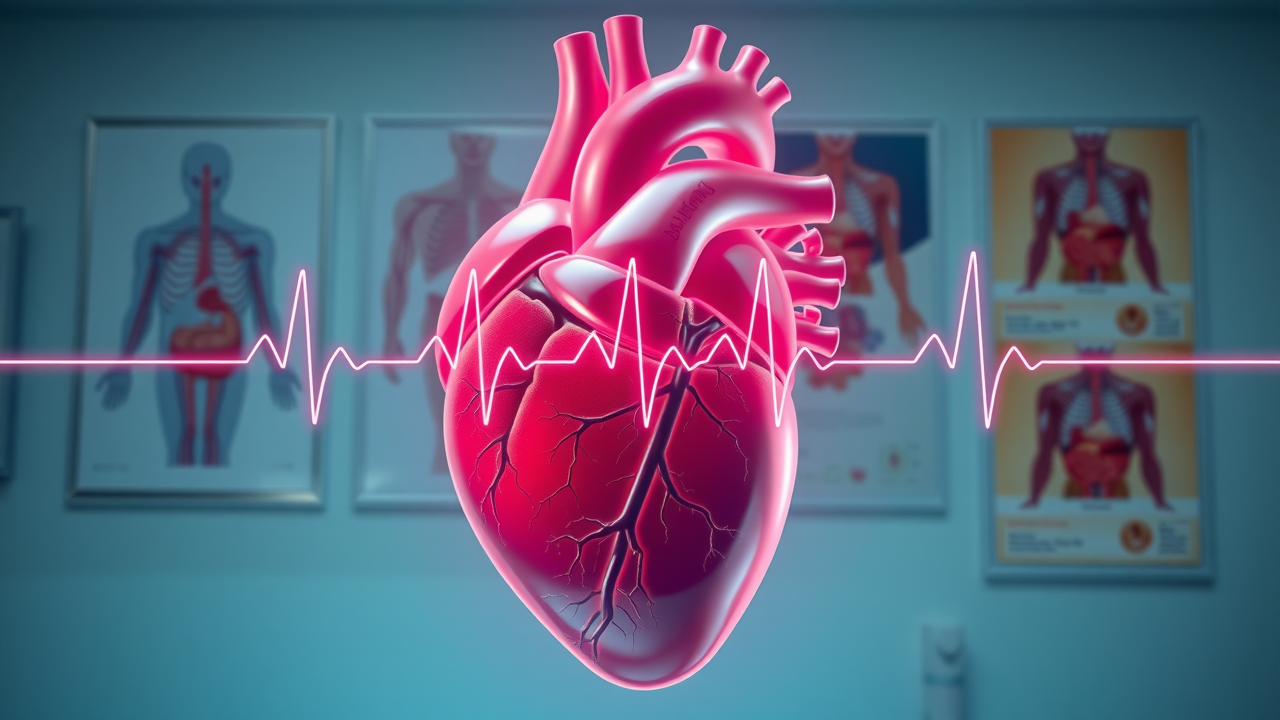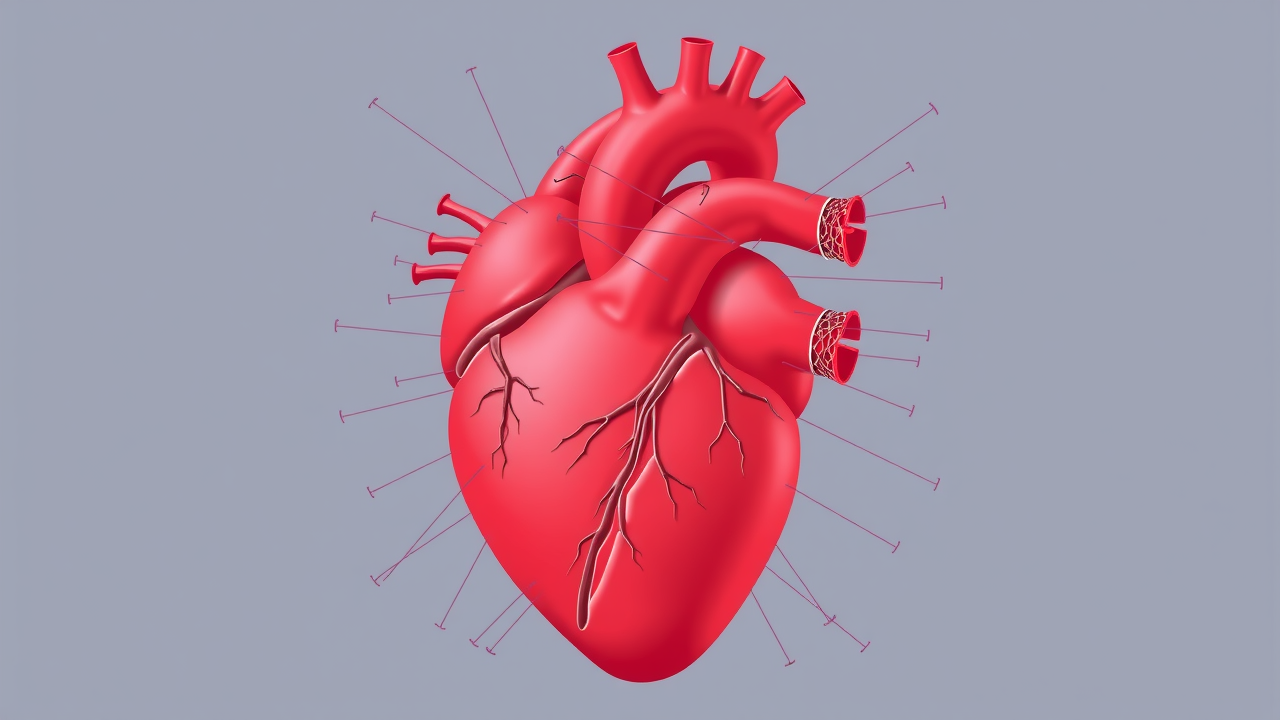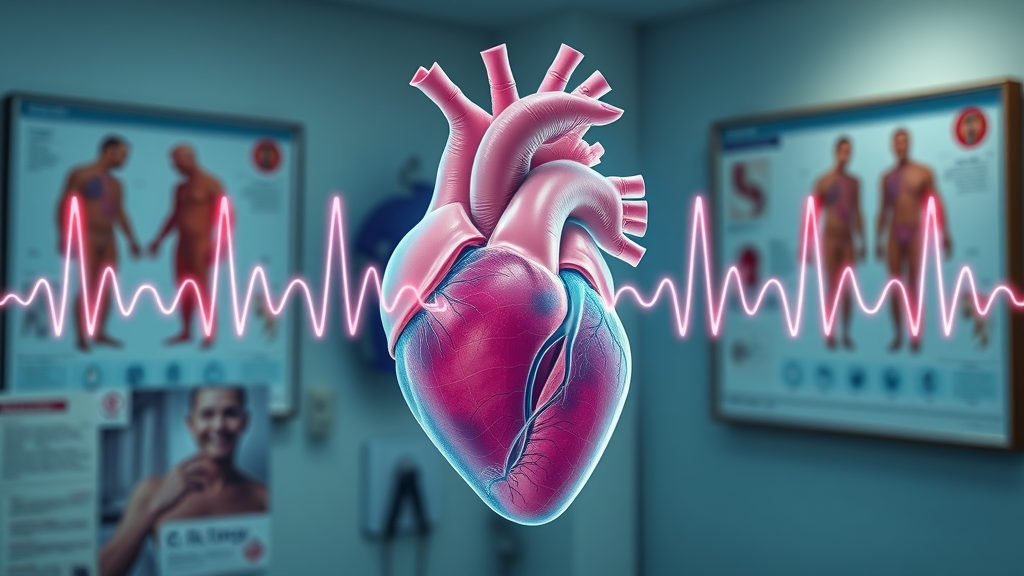Last week, Sarah felt her heart suddenly pounding erratically during a quiet meeting—scary and confusing. Heart palpitations disrupt life, but understanding their triggers can ease your mind and guide you to relief. Let's uncover what causes these unsettling moments and how you can take control.

The Reality of Heart Palpitations: A Sudden Shock
Heart palpitations can strike unexpectedly, often catching people off guard and disrupting their normal heart rhythm in ordinary situations. Imagine sitting at your desk, focused on work, when suddenly you feel your heart pounding or racing in your chest. These episodes may last only a few seconds but can make you worry about your heart health.
What causes heart palpitations is not always clear at first, leading to anxiety and questions about whether to seek help. Palpitations can feel like your heart is skipping beats, adding extra beats, or fluttering, and sometimes accompanied by sensations in the throat or neck. Recognizing these signs is essential: while heart palpitations are common, knowing when they indicate a more serious heart disease or medical condition can make all the difference.
The experience of palpitations can range from mildly annoying to overwhelming and frightening. For many, these symptoms resolve on their own and may be linked to certain triggers like stress, caffeine, or lack of sleep. However, in some cases, heart palpitations are a sign of a more serious underlying medical condition, such as an abnormal heart rhythm or even heart disease.
By exploring the possible causes, warning signs, and prevention strategies, you can take charge of your health, reduce worry, and know when to seek medical attention or consult your care provider. Let’s dive into the world of heart palpitations to help you understand what's really going on when your heart beats out of rhythm.

What You'll Learn About What Causes Heart Palpitations
Understand the definition of heart palpitations and why they occur
Identify common and hidden causes of heart palpitations
Learn about the connection between heart rhythm, medical conditions, and symptoms
Discover risk factors and prevention techniques
Know when to seek medical attention
Understanding What Causes Heart Palpitations
When your heart is beating irregularly or unexpectedly, it can be alarming. Typically, your heartbeat moves at a steady rhythm, unnoticed as you go about your day. A heart palpitation is when you become suddenly aware of your heart’s activity — it might beat faster, flutter, or even pause. Understanding what causes heart palpitations requires a closer look at how the heart works, including the heart rhythm and the many different triggers that might throw it off balance.
Factors may be benign or indicate an underlying medical condition. The key is to pay close attention to your symptoms, frequency, and any accompanying issues like chest pain or dizziness, as these could indicate a more serious problem such as an abnormal heart rhythm.
Palpitations often happen when you’re at rest, but can also strike during activities or after intense emotions, causing an irregular heart rhythm. While heart palpitations are common in people of all ages, everyone’s experience differs. Frequent or severe palpitations, or those partnered with symptoms like shortness of breath, fainting, or chest discomfort, should prompt you to contact your care provider for further evaluation. Knowing the difference between a harmless blip and a warning sign protects your heart — and your peace of mind.
For those interested in additional ways to support heart health and potentially reduce the frequency of palpitations, exploring complementary wellness strategies can be beneficial. For example, sauna therapy has been shown to offer unique cardiovascular benefits that may help some individuals manage symptoms and improve overall heart function.

What Are Heart Palpitations?
Heart palpitations refer to the noticeable sensations of your heart beating irregularly, too quickly, too slowly, or skipping beats. Most people describe them as a feeling that the heart is pounding, fluttering, or beating much harder than normal. Palpitations may be felt in the chest, neck, or even the throat, and can last for just a few seconds or persist for minutes. Some palpitations result from common triggers like stress or caffeine, while others may signal a more serious heart condition or an abnormal heart rhythm, such as atrial fibrillation or other types of arrhythmias.
"Many people will experience heart palpitations at some point, and it’s important to distinguish what is benign from what may need attention." – Cardiologist Dr. Janet Rowe Palpitations by themselves aren’t always a cause for concern. However, the presence of accompanying symptoms like dizziness, chest pain, or fainting may indicate an emergency. Monitoring how often your heart seems to beat out of rhythm, as well as what you were doing before the episode, helps your care provider assess whether further tests are needed to rule out underlying heart arrhythmia or abnormal heart rhythm.
The Heart’s Rhythm and Irregular Heartbeats
The heart relies on an intricate electrical system to generate each beat. This steady signal triggers the muscles of the heart to contract and pump blood efficiently to the body. When something disrupts this electrical pathway, you may notice an irregular heartbeat or feel as if your heart skips, flutters, or pounds. Occasional irregularities aren’t usually dangerous, especially if you’re otherwise healthy. But persistent or severe irregular heartbeats can stem from significant heart conditions requiring prompt evaluation. This is why recognizing changes in your heart rhythm — either abnormally fast, slow, or with extra beats — is crucial.
Sometimes, triggers for an irregular heart rhythm or irregular heartbeat are external, like caffeine, anxiety, or lack of sleep. In other cases, medical causes such as heart disease, electrolyte imbalances, or thyroid disorders come into play. The symptoms you feel depend on the type of rhythm change and your baseline health. Regular checkups can help catch problems early, keeping your heart’s performance strong and steady.

Primary Medical Causes of Heart Palpitations
Not all palpitations are due to lifestyle habits; many stem from underlying medical conditions. Certain illnesses can change the way your heart beats or alter the balance of chemicals and hormones needed for a steady heart rhythm. Common physical causes include hormone imbalances, chronic diseases, and structural heart abnormalities. It’s vital to know the difference between benign triggers and signals that something deeper is wrong. Your care provider will weigh all possible causes before diagnosing and treating the issue.
Some medical conditions linked to heart palpitations are lifelong but manageable with proper care. Understanding these associations gives you the power to work closely with your healthcare team, easing your worries and giving you tools for prevention, monitoring, and control.
Medical Conditions Behind Heart Palpitations
Thyroid disorders
Anemia
Electrolyte imbalances
Fever
Arrhythmias
Heart disease
Structural heart abnormalities
What causes heart palpitations from a medical standpoint? Conditions like hyperthyroidism (overactive thyroid) make the heart beat faster and less predictably. Anemia reduces the blood’s ability to carry oxygen, pushing the heart to beat harder. Electrolytes — minerals like potassium, sodium, and calcium — control the electrical impulses for a healthy heart rhythm. When these are out of balance, it can lead to palpitations or irregular heartbeats.
Fevers often increase your heart rate, causing palpitations until your body returns to its normal state. Structural problems with the heart’s valves, walls, or chambers — as seen in some types of heart disease — also disrupt normal rhythm, making it vital to get an accurate diagnosis. In all cases, working with your healthcare team is essential to manage symptoms and improve heart health.
Heart Palpitations and Heart Disease
A significant concern for both patients and doctors is distinguishing between benign palpitations and those linked to heart disease. Palpitations can sometimes be an early warning sign of conditions like coronary artery disease, congestive heart failure, or structural issues like valve disease. These scenarios call for careful evaluation, particularly if palpitations occur alongside symptoms such as persistent chest pain, shortness of breath, fainting, or extreme fatigue.
In some cases, palpitations signal the presence of heart arrhythmia, such as atrial fibrillation, which increases the risk of blood clots and stroke. Early detection and treatment are crucial to manage risk factors, improve outcomes, and potentially save lives. Anyone with pre-existing heart conditions should monitor symptoms closely and inform their care provider about any new or changing palpitations.
Other Medical Conditions Associated With Palpitations
Hormonal changes
Stress and anxiety disorders
Stimulant use (caffeine, nicotine)
Beyond classic medical illnesses, other contributors to heart palpitations include hormonal fluctuations (such as those occurring during pregnancy, menopause, or menstruation), mental health challenges like anxiety and panic attacks, and recreational or medicinal use of stimulants. All of these can prompt your heart to beat irregularly, especially in those who are more sensitive to changes or already have minor rhythm variations.
By recognizing these factors, individuals can modify their lifestyle, seek appropriate treatment for mental health concerns, or limit stimulant intake to reduce the frequency and intensity of palpitations. Tracking when and how symptoms happen gives valuable clues for your care provider to tailor your care.

Lifestyle Triggers: Everyday Risks for Heart Palpitations
Excessive caffeine or alcohol intake
Intense emotional stress
Lack of sleep
Overexercise
Certain medications
Daily habits have a big impact on what causes heart palpitations and can influence your heart rhythm for many people. Consuming large amounts of caffeine, energy drinks, or alcohol can provoke rapid or irregular heartbeats. Similarly, chronic stress or acute emotional turmoil triggers the body’s fight-or-flight response, flooding it with adrenaline and prompting your heart to beat harder and faster.
Not getting enough sleep or pushing your body with high-intensity exercise without proper rest also puts extra strain on your heart. Some medications, both prescription and over-the-counter, contain stimulants or other ingredients that can cause palpitations as a side effect. Reviewing medication lists with your healthcare team is a smart step if you frequently experience pounding or racing sensations.
Risk Factors: Who Is Most Susceptible to Heart Palpitations?
Certain groups are more likely to experience heart palpitations, especially those with existing medical conditions, heart disease, or risky behaviors that increase risk factors. Understanding your risk profile helps you make informed lifestyle modifications and prioritize preventive care. Age and gender can play a role, with women and older adults reporting palpitations more frequently. Stubborn health issues like hypertension and diabetes further increase the odds of palpitations or underlying heart disease.
Lifestyle habits such as smoking, heavy alcohol use, or consistently poor sleep multiply risk, making it vital to address these patterns early. Recognizing that anyone — regardless of background — can be affected by palpitations empowers you to monitor symptoms and seek care as needed. The chart below offers a visual summary of common risk factors.hol
When Should You Seek Medical Attention for Heart Palpitations?
Not all heart palpitations require emergency intervention, but certain symptoms should prompt urgent evaluation. Seek medical attention promptly if palpitations occur with chest pain, shortness of breath, excessive dizziness, fainting, or extreme fatigue, as these symptoms may indicate serious heart disease or an abnormal heart rhythm. These warning signs can indicate an underlying heart disease or abnormal heart rhythm that needs immediate care.
You should also consult your care provider for frequent, unexplained, or worsening palpitations, or if you have a personal or family history of heart conditions. Always err on the side of caution: timely diagnosis and treatment can prevent complications and bring peace of mind.

Diagnosing What Causes Heart Palpitations: At the Care Provider’s Office
When you visit your healthcare provider to discuss heart palpitations, expect a structured evaluation. Timely diagnosis ensures that serious conditions are identified early, and that you can receive reassurance when symptoms are benign. The process is thorough and involves multiple steps — from your initial history to advanced diagnostic tools — to pinpoint what causes your heart to beat irregularly.
Understanding what happens in the exam room lets you prepare and advocate for the care you need. Be ready to describe your symptoms in detail, and bring a list of your current medications and any relevant medical history.
What to Expect During Your Clinical Evaluation
Patient history
Physical examination
Heart rhythm monitoring (ECG/Holter)
Blood tests
Imaging
A standard workup begins with your provider taking a detailed account of your health background, recent activities, and any associated symptoms. A physical exam helps check for visible signs or physical triggers of palpitations, such as thyroid enlargement or cardiac irregularities.
Next, heart rhythm monitoring tools like a 12-lead ECG or portable Holter monitor track your heartbeat over time, capturing abnormal patterns and matching them to your symptoms. Blood tests may look for anemia, thyroid concerns, or electrolyte imbalances. When necessary, imaging studies — like echocardiograms or stress tests — reveal structural or functional heart abnormalities. Each step narrows down possible causes, guiding you toward the right diagnosis and management plan.
Questions Your Care Provider May Ask
During your appointment, expect your provider to ask detailed questions, including:
How often do you experience heart palpitations?
How long does each episode last?
Can you describe what the palpitations feel like?
Are there any activities, foods, or stresses that seem to trigger them?
Do you have any other symptoms, such as dizziness, chest pain, or shortness of breath?
Is there a family history of abnormal heart rhythms or heart disease?
What medications or supplements are you taking?
Managing and Preventing Heart Palpitations
Lifestyle adjustments (reducing caffeine, better sleep, stress management)
Medical treatment options
Monitoring techniques
Once you and your care provider have identified what causes heart palpitations in your case, you can work together to manage your heart rhythm and keep palpitations at bay. Making lifestyle changes — like cutting back on stimulants, building a consistent sleep routine, and practicing stress reduction techniques — can have a big impact. Monitoring your symptoms with a diary or wearable device also helps spot patterns and measure progress.
For some people, medication or even small procedures may be necessary to control troublesome palpitations, especially if they stem from abnormal heart rhythm or heart disease. Regular follow-up with your care provider ensures you receive the safest, most effective care. Remember: knowledge and self-awareness are your best defenses against heart worries.
People Also Ask: What Causes Heart Palpitations?
How do you stop heart palpitations?
If you experience a sudden episode of heart palpitations, the first step is to remain calm. Practice slow, deep breathing to relax your body and restore your natural heart rhythm. Sometimes, drinking a glass of cold water or splashing your face with water can help. Identify and remove any immediate triggers (stress, caffeine, etc.). Avoid sudden movement and sit or lie down until your heartbeat steadies. If palpitations are persistent, severe, or accompanied by chest pain, dizziness, or fainting, seek medical attention immediately.
When should I worry about heart palpitations?
You should worry and seek prompt medical care if heart palpitations are accompanied by additional symptoms such as chest pain, shortness of breath, fainting, heavy sweating, or severe dizziness. Likewise, if palpitations occur frequently, last for a prolonged time, or if you have a known history of heart disease or abnormal heart rhythms, consult your care provider as soon as possible. When unsure, always err on the side of caution.
What deficiency causes heart palpitations?
Common deficiencies that can lead to palpitations include low levels of potassium, magnesium, or calcium (electrolyte imbalances), and anemia due to iron deficiency. These deficiencies can disrupt the heart’s electrical system or reduce oxygen-carrying capacity, leading to irregular heartbeats. Maintaining balanced nutrition and regular health checks can prevent or correct these deficiencies and reduce palpitations.
Can drinking water stop heart palpitations?
Drinking water can sometimes help stop palpitations, especially if dehydration is the cause. Proper hydration supports normal blood volume and healthy electrolyte balance, both necessary for a regular heart rhythm. While water is not a cure for all causes of palpitations, it is a safe and simple first step to try at home. If symptoms persist, consult your provider.

Frequently Asked Questions (FAQs) About What Causes Heart Palpitations
Can stress alone cause heart palpitations?
Yes, stress and anxiety are common triggers for heart palpitations. The surge of adrenaline during stressful events can cause your heart to beat faster or irregularly, even if you have no underlying heart issues.Are heart palpitations always a sign of heart disease?
No, heart palpitations are often benign and caused by lifestyle factors like caffeine or stress. However, persistent or severe palpitations should be assessed by your care provider to rule out underlying heart diseases.What medications commonly trigger heart palpitations?
Some decongestants, asthma inhalers, thyroid medications, and certain antidepressants can cause palpitations as a side effect. Always review your medications with your healthcare team if you notice new symptoms.
Key Takeaways: Understanding and Managing What Causes Heart Palpitations
Heart palpitations are often benign but can signal underlying issues
Identifying personal triggers is key
Always seek professional advice for persistent or severe symptoms
Conclusion: Take Charge of Your Heart Health
Understanding what causes heart palpitations empowers you to manage symptoms, make positive lifestyle changes, and know when to seek help — so your heart stays strong and steady.
If you’re committed to protecting your heart and want to deepen your understanding of cardiovascular risks, it’s wise to look beyond palpitations and consider other major health factors. For instance, women face unique challenges when it comes to heart and vascular health. To gain a broader perspective on prevention and early detection, explore our comprehensive guide on essential stroke risk factors every woman should recognize. Expanding your knowledge can empower you to make informed choices and take proactive steps for lifelong wellness.
Sources
Heart palpitations are sensations where your heart feels like it’s pounding, fluttering, or beating irregularly. While often harmless, they can sometimes indicate underlying health issues. Common causes include stress, anxiety, strenuous exercise, caffeine, nicotine, fever, hormonal changes, and certain medications. (mayoclinic.org)
Medical conditions such as thyroid disorders, anemia, electrolyte imbalances, and heart disease can also lead to palpitations. (nyp.org) If palpitations are accompanied by chest pain, shortness of breath, dizziness, or fainting, it’s crucial to seek medical attention promptly. (tuftsmedicine.org)
 Add Row
Add Row  Add
Add 




Write A Comment